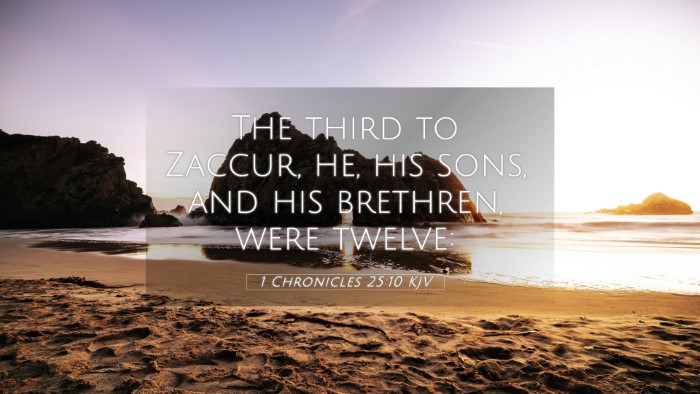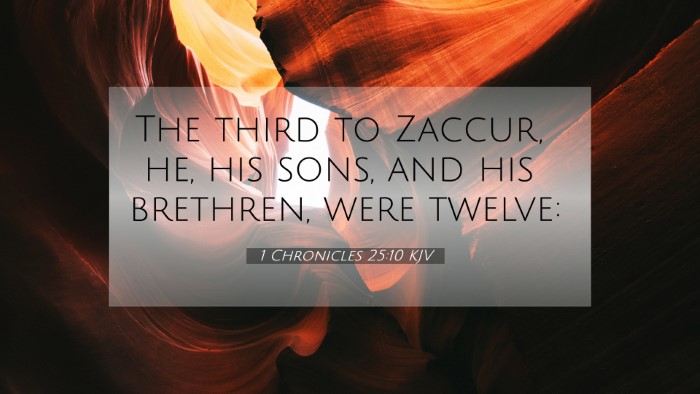Exploration of 1 Chronicles 25:10
Verse: 1 Chronicles 25:10
Meaning and Interpretation:
The verse reads:
"And the third, with his sons and his brethren, were twelve; and the fourth, with his sons and his brethren, were twenty and four."
This verse occurs in the context of the organization of the Levitical singers and musicians who served in the temple during the reign of David. It highlights not only the number of individuals involved in the musical service but also their familial relations, emphasizing the importance of both community and lineage.
Commentary Insights
- Matthew Henry: Matthew Henry highlights the significance of music in worship and notes that these divisions of singers were appointed for the service of the house of God. He elaborates that the structure and organization of the singers were important for maintaining order in worship and ensuring that everyone had a role.
- Albert Barnes: Barnes emphasizes the collective effort in worship, as illustrated by the references to "sons and brethren." He points out that this reflects a family-oriented approach to serving God, implying unity among the worshippers. He draws attention to the precision of their numbers, which signifies careful planning in divine service.
- Adam Clarke: Clarke inspects the numbers themselves and sees that they are symbolic of divine order and perfection. He connects the role of the Levitical musicians to the larger theme of worship in the Old Testament, noting that the attentive organization was vital for the honor and glory of God in His sanctuary.
Thematic Connections
This verse has numerous thematic Bible verse connections that enhance its understanding:
- Psalm 150:3-5: This psalm encourages praise through music, strengthening the idea that worship through song is a vital component of glorifying God.
- 1 Chronicles 6:31: This verse records the establishment of the worship of God through music, drawing a direct line to the importance of these Levites in the temple service.
- 2 Chronicles 5:12-14: Here, we see the Levitical singers under the leadership of Asaph participating in musical worship at the dedication of the temple, illustrating the fulfillment of their roles as seen in 1 Chronicles 25:10.
- Ephesians 5:19: This New Testament verse encourages singing psalms, hymns, and spiritual songs, reinforcing the continuous role of music in worship across both Testaments.
- Colossians 3:16: Similar to Ephesians, Colossians promotes the practice of teaching and admonishing one another through music, echoing the communal aspect emphasized in 1 Chronicles 25:10.
- 1 Samuel 10:5: This highlights the role of music in prophetic experiences, connecting the Levitical roles to a broader understanding of music in providing spiritual insight.
- Nehemiah 12:8: This verse further identifies the importance of musicians in the restored worship after exile, showcasing the continuity of the traditions established in 1 Chronicles.
Bible Verse Cross-References
1 Chronicles 25:10 can be cross-referenced with additional verses to see the inter-Biblical dialogue:
- 1 Chronicles 6:31 - Talks about the appointments of the Levitical singers.
- 2 Chronicles 29:25 - Discusses the commissioning of Levites for worship service.
- Hebrews 2:12 - This connects the praise to Jesus, who is surrounded by worshippers.
- Psalm 68:25 - Presents the singers as leaders of praise.
Tools for Bible Cross-Referencing
For deeper understanding and study, consider these tools and methods:
- Bible Concordance: A valuable resource allowing you to find keywords and their occurrences across the scriptures.
- Bible Cross-Reference Guide: Use these guides for thematic insights into connections across passages.
- Cross-Reference Bible Study: Engaging in this study method allows for comprehensive understanding through interconnected verses.
- Comprehensive Bible Cross-Reference Materials: Invest in materials that provide extensive cross-reference for deeper study.
- Bible Chain References: Following chains of related verses can illuminate themes across scripture.
Conclusion
1 Chronicles 25:10 serves not only as a historical account but as an invitation to explore the rich tapestry of music and worship within the biblical narrative. By engaging with various commentaries and cross-referencing verses, one can glean deeper insights into the significance of this verse.


